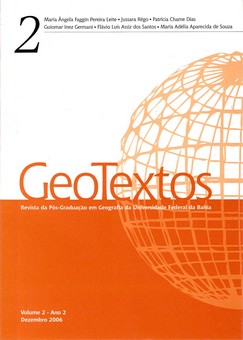Territórios do candomblé
a desterritorialização dos terreiros na Região Metropolitana de Salvador, Bahia
DOI:
https://doi.org/10.9771/1984-5537geo.v2i2.3038Keywords:
Territory, Urban space, Deterritorialization, Candomblé, SalvadorAbstract
This paper shows that the territorialization, deterritorialization and reterritorialization experienced by the Terreiros de Candomblé (Areas of Worship) are recurrent, especially when their spacialization within the city is taken in consideration. This Brazilian religion, which aggregates several African liturgical structures, is the result of a successful strategy of survival of the African blacks, who had gone through deterritorialization and were brought to Brazil as slaves. The cult, with its own identity, was scattered all over the city under the form of Terreiros, its characteristic of settlement, whose territorial domains were delimited by territorial symbolism. Its urban dimension presents variations, whose visible temporalities were determined by the social relationships that were constantly submitted to the segregation processes that characterize the city. Thus, the aim of this research is to analyze the situation of the Terreiros in the city, focusing on their status of dimension producers, showing the ongoing processes of deterritorialization of their space and operation. It also intends to call attention to the importance of the discontinuous territories for the cult preservation, namely woods, lagoons mangroves and natural areas, which are becoming scarcer all over the city. To carry out the research, after the data survey based on a bibliography research were collected, the methodological resource used was to fill out a database with primary data on the candomblé houses, based on questionnaires answered by the qualified community members, followed by interviews to obtain data to visualize the situation of the candomblé houses in the city. This analysis showed the projection that this form of settlement peculiar to the region being studied has gone through in the city of Salvador a visible transformation of its model that was originally implemented in the city. A model that conciliates the dynamics of reproduction inherent to the cult with the possibility of reproduction within the major urban centers, including the economic and social relationships involved, which have a strong influence on the new territorialization.
Downloads
Downloads
Published
How to Cite
Issue
Section
License
Autores que publicam nesta revista concordam com os seguintes termos:
Autores mantém os direitos autorais e concedem à revista o direito de primeira publicação, com o artigo simultaneamente licenciado sob a Licença Creative Commons Creative Commons CC BY que permite o compartilhamento do trabalho com reconhecimento da autoria e publicação inicial nesta revista. Esta licença permite que outros distribuam, remixem, adaptem e criem a partir do seu trabalho, mesmo para fins comerciais, desde que lhe atribuam o devido crédito pela criação original. É a licença mais flexível de todas as licenças disponíveis. É recomendada para maximizar a disseminação e uso dos materiais licenciados. Ver o resumo da licença em: https://creativecommons.org/licenses/by/4.0/ Ver o texto legal da licença em: https://creativecommons.org/licenses/by/4.0/ Consulte o site do Creative Commons: https://creativecommons.org/licenses/?lang=pt
Autores têm autorização para assumir contratos adicionais separadamente, para distribuição não-exclusiva da versão do trabalho publicada nesta revista (ex.: publicar em repositório institucional ou como capítulo de livro), com reconhecimento de autoria e publicação inicial nesta revista.
Autores têm permissão e são estimulados a publicar e distribuir seu trabalho online (ex.: em repositórios institucionais ou na sua página pessoal) a qualquer ponto antes ou durante o processo editorial, já que isso pode gerar alterações produtivas, bem como aumentar o impacto e a citação do trabalho publicado (Veja O Efeito do Acesso Livre).






